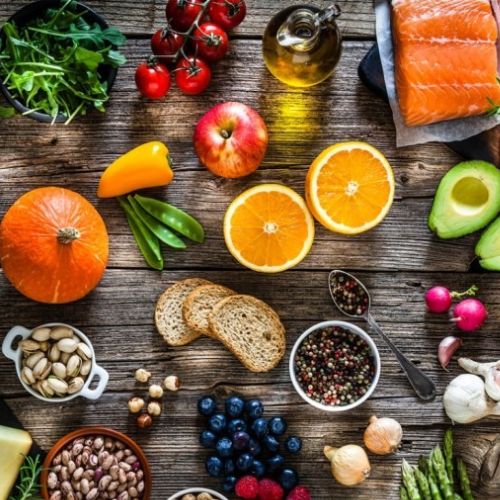
Introduction to Healthy Eating Food Myths
When it comes to healthy eating, there is no shortage of advice and information on what foods to eat and what foods to avoid. However, not all of this information is accurate or backed by scientific evidence. In fact, many popular beliefs about healthy eating are actually myths that have been perpetuated over the years.
In this section, we will explore some common misconceptions about healthy eating and reveal the truth behind these food myths. By understanding the real facts, you can make informed decisions about your diet and lead a healthier lifestyle.

Myth #1: Carbs are Bad for You
The first and most common myth surrounding healthy eating is that carbohydrates are bad for you. This belief has been perpetuated by various fad diets and popular media, leading many people to avoid carbs in order to lose weight or improve their health. However, the truth is that not all carbs are created equal and demonizing all carbs as "bad" can actually do more harm than good when it comes to our overall health.
To start, it's important to understand that carbohydrates are one of the three main macronutrients (along with protein and fat) that our bodies need for energy and proper functioning. Carbs provide glucose - which is the primary source of fuel for our brains and muscles - and they also play a crucial role in maintaining a balanced diet. Therefore, completely cutting out carbs from your diet can be detrimental to your health.
The main issue with the "carbs are bad" myth is that it often fails to differentiate between simple and complex carbohydrates. Simple carbs, such as those found in sugar-sweetened beverages, pastries, white bread, and other highly processed foods, have little nutritional value other than providing a quick burst of energy. These types of carbs can lead to spikes in blood sugar levels which can contribute to weight gain, insulin resistance, type 2 diabetes, and other health issues.
Myth #2: Fat is Always Unhealthy
One of the most common food myths that has been ingrained in our minds is that fat is always unhealthy. For decades, people have been told to avoid consuming fatty foods in order to maintain a healthy lifestyle and prevent various diseases. However, recent studies have shown that this belief may not be entirely true.
First and foremost, it's important to understand that not all types of fat are created equal. There are different types of fat which play different roles in our bodies. Trans fats and saturated fats are considered unhealthy because they can increase cholesterol levels and raise the risk of heart disease. On the other hand, unsaturated fats (such as monounsaturated and polyunsaturated) are actually beneficial for our health as they can help lower cholesterol levels and reduce the risk of heart disease.
Moreover, our bodies need some amount of fat for proper functioning. Fats provide energy, help absorb certain vitamins (such as A, D, E, and K), support cell growth and protect organs. Without enough fat intake, our body may start breaking down muscle tissue for energy which can lead to weakness and fatigue.
Myth #3: Skipping Meals Helps You Lose Weight
Many people believe that skipping meals, especially breakfast, can help with weight loss. However, this is far from the truth. In fact, skipping meals can actually have negative effects on your overall health and weight loss goals.
The idea behind this myth is that by skipping meals, you are reducing your calorie intake and therefore promoting weight loss. While it is true that a calorie deficit is necessary for weight loss, skipping meals is not the way to achieve it.
One of the main reasons why skipping meals does not lead to weight loss is because it often leads to overeating later in the day. When you skip a meal, your body goes into starvation mode and starts conserving energy. This means that when you do eat, your body will hold onto those calories instead of burning them off efficiently. As a result, you may end up consuming more calories than if you had eaten regular meals throughout the day.
Myth #4: All Processed Foods are Unhealthy
Processed foods have been given a bad reputation in the health and wellness world, with many people believing that they are inherently unhealthy and should be avoided at all costs. However, the truth is that not all processed foods are created equal, and labeling them as universally unhealthy is an oversimplification of a complex issue.
Firstly, it's important to understand what we mean by "processed" foods. This term refers to any food item that has undergone some type of change from its natural state – whether through cooking, freezing, canning, or adding preservatives or other ingredients. In fact, most of the food we consume on a daily basis is processed in some way. For example, canned vegetables go through a heating process for preservation while yogurt undergoes fermentation before being packaged.
The problem lies with heavily processed foods – those that have been significantly altered from their natural state and contain added sugars, refined grains, artificial flavors and preservatives. These types of processed foods tend to be high in calories but low in essential nutrients such as vitamins, minerals and fiber. They also often contain high levels of sodium which can contribute to health issues like high blood pressure.

Myth #5: Organic Foods are Always Better for You
Organic foods have gained a lot of popularity in recent years, with many people believing that they are the healthier option compared to conventionally grown produce. However, this belief is not entirely accurate and there are several misconceptions surrounding organic foods.
One of the main reasons why people believe that organic foods are always better for you is because they are grown without the use of synthetic pesticides and fertilizers. While it is true that organic farming prohibits the use of these chemicals, it does not mean that organic produce is completely free from them.
Another common misconception about organic foods is that they contain higher levels of nutrients compared to conventionally grown produce. This belief stems from the idea that since organic farming relies on natural methods, the soil is richer in nutrients which then translates to more nutritious crops. However, research has shown that there is no significant difference in nutrient levels between organically and conventionally grown produce.
Conclusion
As we have seen, many of the common food myths surrounding healthy eating are simply not true. It is important to educate ourselves and make informed decisions about our diet rather than blindly following these misconceptions. By incorporating a balanced variety of whole foods into our meals and listening to our bodies' signals, we can achieve optimal health without falling prey to food myths. Let's break free from these false beliefs and embrace a healthier lifestyle for the benefit of our physical, mental, and emotional well-being.


